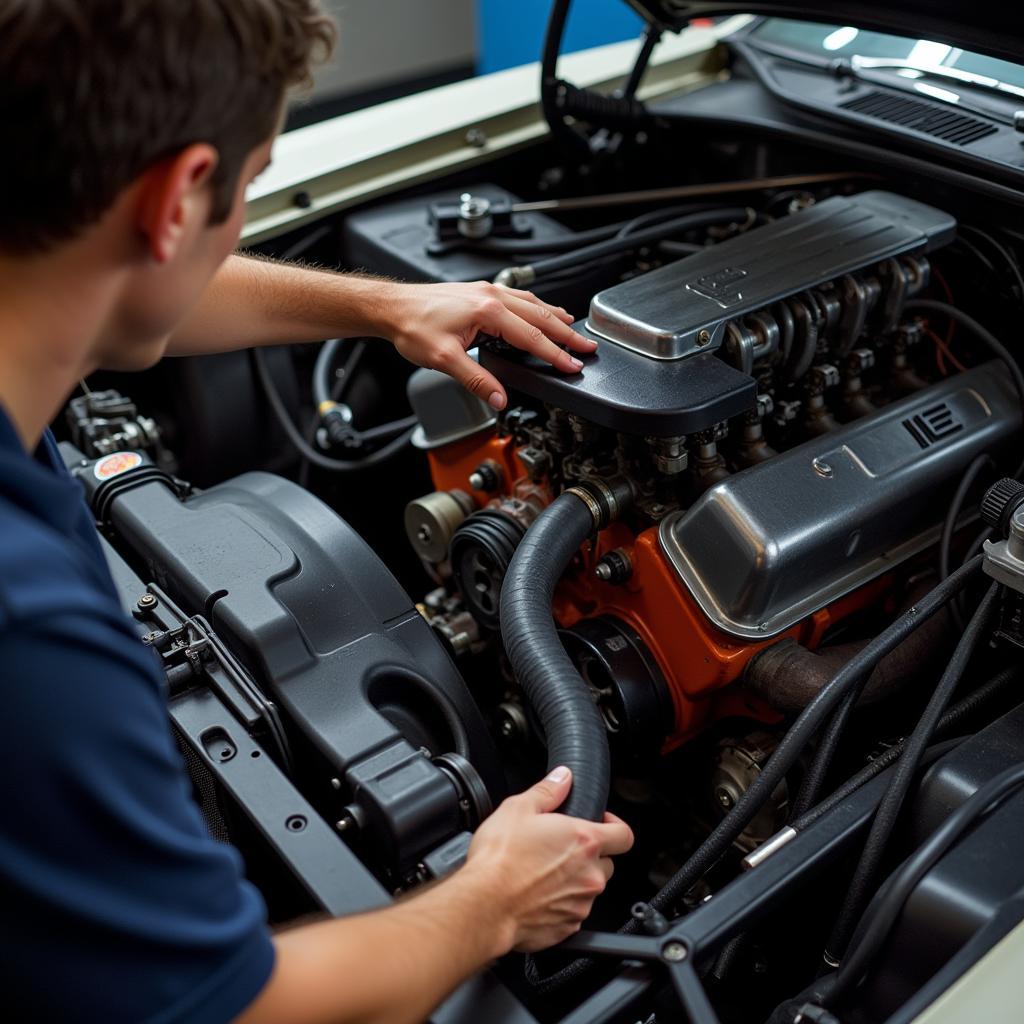When it comes to choosing a muscle car, reliability is often a key concern, especially when considering models like the Camaro, Charger, or Mustang. You’re looking for exhilarating performance, but not at the expense of constant trips to the mechanic. So, which car has fewest engine problems: Camaro, Charger, or Mustang? The answer, as with most car comparisons, isn’t straightforward. Let’s dive deep into the engine reliability of these iconic American muscle cars to help you make an informed decision.
Decoding Engine Reliability: Camaro vs. Charger vs. Mustang
Comparing the engine reliability of these three muscle cars requires a nuanced approach. Each model offers various engine options, impacting potential issues and maintenance needs. Furthermore, real-world reliability is affected by factors like driving habits, maintenance schedules, and even climate.
Camaro Engine Reliability: A Closer Look
The Chevrolet Camaro boasts a range of engines, from the powerful V8 to the more fuel-efficient four-cylinder. Historically, the Camaro’s V8 engines have been praised for their power, but some generations have faced issues like head gasket failures and oil consumption. The newer, smaller engines tend to be more reliable, though they might not deliver the raw power some muscle car enthusiasts crave.
Charger Engine Reliability: Hemi Power and Potential Problems
The Dodge Charger, known for its aggressive styling and Hemi V8 engine options, offers exhilarating performance. However, the powerful Hemi engines haven’t been immune to problems, with some owners reporting issues with valve train components and oil consumption. The V6 engines in the Charger lineup generally have a better reliability track record.
Mustang Engine Reliability: EcoBoost and Coyote Considerations
The Ford Mustang offers a diverse engine lineup, including the EcoBoost four-cylinder and the iconic Coyote V8. The EcoBoost, while providing impressive fuel economy, has been associated with some issues, such as coolant leaks and turbocharger problems. The Coyote V8, while generally robust, has had some reported issues with timing chain tensioners.
Which Engine is Right For You? Weighing Performance and Reliability
The “best” engine depends on your priorities. If sheer power is your ultimate goal, the V8 options in the Camaro, Charger, and Mustang offer thrilling performance, though they may come with a slightly higher risk of certain engine problems. If fuel efficiency and reliability are paramount, the smaller engine options are generally more dependable, albeit with less horsepower.
Common Engine Problems and Solutions
Regardless of the model you choose, regular maintenance is crucial. Common engine problems across these muscle cars can include issues with spark plugs, ignition coils, and sensors. Staying on top of scheduled maintenance, using high-quality fluids, and addressing any warning lights promptly can significantly improve engine longevity.
 Muscle Car Maintenance
Muscle Car Maintenance
Expert Insights: What the Pros Say
“The key to avoiding engine problems in any muscle car is proactive maintenance. Regular oil changes, using the correct oil type, and addressing small issues before they become major problems can make all the difference.” – David Miller, Automotive Engineer
“Don’t underestimate the importance of driving habits. Aggressive driving can put extra strain on the engine, leading to premature wear and tear. Smooth acceleration and sensible driving can significantly extend the life of your engine.” – Susan Ramirez, Certified Mechanic
Conclusion: Choosing Your Muscle Car Wisely
Ultimately, the Camaro, Charger, and Mustang each offer unique strengths and potential weaknesses regarding engine reliability. By understanding the specific engine options, common problems, and the importance of regular maintenance, you can make a well-informed decision and enjoy your muscle car for years to come. Contact AutoTipPro at +1 (641) 206-8880 or visit our office at 500 N St Mary’s St, San Antonio, TX 78205, United States, for personalized guidance. Which car has fewest engine problems: Camaro, Charger, or Mustang? It depends on your specific needs and preferences.
FAQ
-
What are the most common engine problems in muscle cars?
- Common issues include problems with spark plugs, ignition coils, sensors, and sometimes more significant issues like head gasket failures or oil consumption depending on the specific engine and model year.
-
How often should I change the oil in my muscle car?
- Follow the manufacturer’s recommended oil change intervals. Generally, this is every 5,000-7,500 miles or every 6 months, whichever comes first.
-
What type of oil should I use in my muscle car?
- Refer to your owner’s manual for the recommended oil viscosity and type.
-
What are the signs of a failing head gasket?
- Signs can include white smoke from the exhaust, coolant loss, overheating, and milky oil.
-
How can I improve my muscle car’s engine reliability?
- Regular maintenance, using high-quality fluids, and addressing warning lights promptly can greatly improve engine reliability.
-
Is the EcoBoost engine reliable?
- While offering good fuel economy, the EcoBoost engine has had some reported issues like coolant leaks and turbocharger problems, although these have been addressed in newer models.
-
Is the Hemi engine reliable?
- The Hemi V8 is known for its power, but some owners have reported problems with valve train components and oil consumption. Regular maintenance is essential.





Leave a Reply